The area located at 735 meters from Helmos, in mountainous Achaia, 189 kilometers from Athens and 77 from Patras won your preferences, for the ski resort, the Vouraikos gorge, the other natural beauties and no, it will not forget to mention Toothless (phew). On your walk you may have seen the Municipal Museum of the Kalavryt Holocaust.
When you step inside you come into contact with the horror - you learn how the Germans killed an entire generation from the area that not only exists to this day, but most likely will exist forever, having survived its worst moment.
To this day, memorial ceremonies for the Kalavryta Holocaust are held every December 13th. Until then, no one decorates for Christmas, in shops or houses and through special ceremonies held in memory of the victims, everything is heard about the men killed by the Nazis.
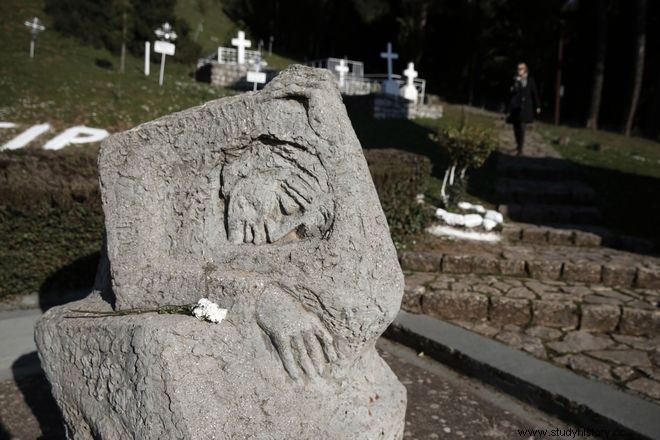
Little Paris
The show "Reportage Without Borders" by Stelios Kouloglou, entitled "Nazi, Lithi and Neo-Nazi" which aired on NET on 6/2/1 of 2013 has material that you will hardly find anywhere else. About fascism, but also what happened in Kalavryta.
Before the war, Kalavryta was known as "little Paris". There were all the services, the train the best ambassador of the city, philharmonic, entertainment centers, shopping center that served the surrounding areas as well. It also had 4-5 taxis, at the time when it was improbable for a provincial town to have even one taxi, as Giorgos Dimopoulos had pointed out on the show. Francesca Nika added "it was buzzing with people". In essence, it was a capital city.
"Its inhabitants enjoyed life. They were not 'made' to be heroes". And they lived in love with each other, having as common interests "dances, parades, music on Sundays" according to the memories of Sotiris Thanopoulos. There was a lot of volunteering from the students, to go to the music". They did not fail to celebrate together, every Full Moon. "They were evenings of celebration".
Rozina Asher Pardo was 7 years old on October 28, 1940 and "I remember going to first grade. When war was declared, we celebrated because we would not go to school. Then, of course, everything changed." They changed when the bombing started. "We lived in the center of the city when the Italians bombed the port of Thessaloniki. What was happening was terrifying for a child" and not only that.
"We were in the vineyard, when suddenly we heard the bells ringing and immediately we saw a swarm of planes - we hadn't seen a single one," says Eleni Sfoundouri, "passed over us to bomb Patras".
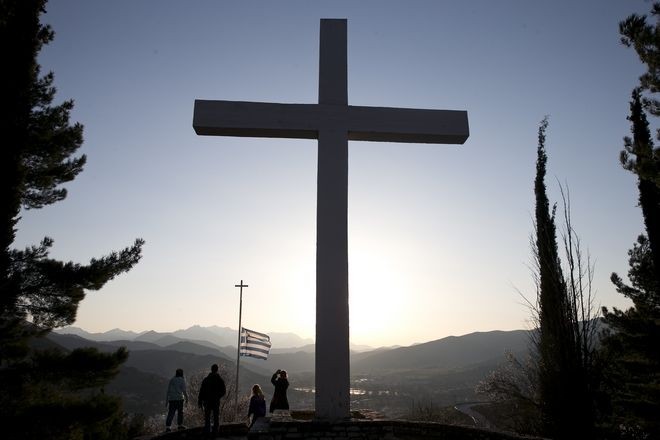
Maria Manolakou was in Patras and remembers "how we saw the planes lined up and the bombs falling. The school started shaking, we were suffocated by the plaster. We spilled out into the streets, with the bombs still falling. I remember running with a friend , we crossed paths with a group of boys cursing some fascism. We had no idea what that meant. I asked my friend what fascism was. She said 'run now and we'll look it up in the dictionary.' By the time they got home "we saw people down, we were jumping over blood, a bus was on fire and smoke was coming out of all the buildings".
The first announcement
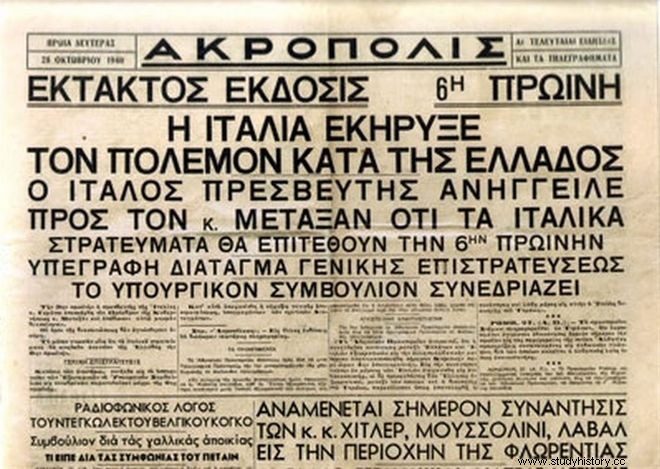
The first communique said that "The Italian military forces are attacking from 05:30 today the main defense units of the Greek-Albanian border. The main forces are defending the homeland". Chief announcer (the first) of the Athens Radio Station was Kostas Stavropoulos - grandson of the national benefactor Pantazis Vassanis. He also informed that "Greece as of 6 am today is in a state of war with Italy", as well as for the recruitment that took place immediately. "Our older sisters and mothers knitted sweaters and socks for our soldiers. The enthusiasm at the parade was such that anyone who didn't know thought they were going to a festival. Not to war. We were all suffocated by the injustice of this attack."
They boarded the Odontotus to go to Corinth. "I remember the music was playing and people were laughing, saying goodbye from the train car," says Mr. Thanopoulos through sobs.
Moussis Bourlas continues, saying that "we built the first bridge in Premeti. In the morning we 'set up' it so that cars could pass and in the evening we took it so that the Italians would not bombard it. Every night we did this work so that for the cars that fed the front to pass through the night". Which was rudimentary.
Stavros Avdoulos felt the need to explain that "our soldiers were fighting with the munitions they had taken from the beginning, with them. Due to the terrible bad weather of the winter, they had been left barefoot, hence the phenomenon of frostbite was observed. Something terrible it was also the louse. We were removing our flesh from scratching".
Mr. Bourlas was hospitalized in Ioannina with frostbite. "When I went to the hospital, I learned that many people's legs were being amputated. I refused to be amputated, and with four others, we took our splints and went to our units".
In the "British Currents" of 1940 it was reported how "the brave Greeks crushed the ambitions of Italy, on the rugged Albanian mountains. On the steep slopes, the best fighters of Europe are pushed forward to repeat their success. They advance into Albania, in pursuit of the army that he wanted to understand them, as a lesson that fortune favors the bold".
Anna Kalouta had appeared to tell how the actors stopped the performances at every good news and sang the national anthem.
More than 13,000 Greek and 63,000 Italian soldiers were killed. Axis troops had taken over much of Europe. The Greek successes showed the world that the fascist forces were not invincible. "It was a brave blow to the prestige of the Axis" reported the "British News", before Hitler took over what his close ally, Mussolini, had failed to accomplish.
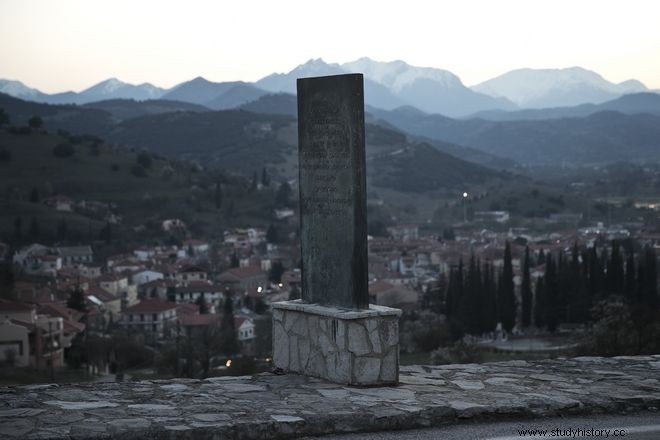
In April 1941, Germany attacked Greece.
The superiority was overwhelming. The Greek army did not even have anti-aircraft guns. It was one of the most heroic battles of World War II, with the Germans later admitting that they had not expected to meet such resistance. When the Greeks were forced to surrender their opponents discovered that their opponents did not even have rifles. Yannis Anastopoulos said that "an order was given to hand over the weaponry".
He hadn't even gotten his own when the war started. He shared one with another soldier fighting in Albania.
"The German collecting the weapons pointed at me with his gun, saying 'this soldier considered it degrading to surrender the weapon and preferred to throw it away. He must die." The officer held his hand and asked me what I had done with my gun. I explained to him that I did not have mine. When informed the German laughed, put the pistol in his pocket and I escaped."
The show presented chilling accounts of the behavior of Jews and images from all over the country. There are also images from Auschwitz, as well as details of how the Germans chose who would go to the crematorium and who would become workers. Along with lies and suffering.
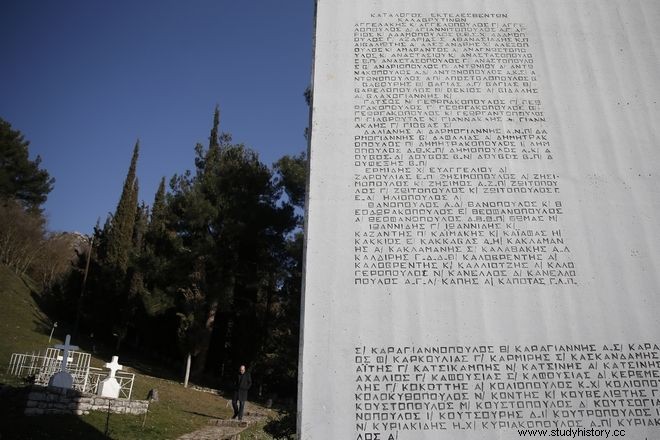
"Unternehmen Kalavryta"
In October 1943 a German detachment tried to approach Kalavrita. He was ambushed by Greek People's Liberation Army rebels. It was a great victory for the rebels (in what is historically referred to as the "Battle of Kerpini" and took place on 20/10). 78 Germans were killed. The chief officer of the Germans committed suicide. The hostages were taken to Kalavryta. The world was excited for the first defeat of the hitherto undefeated Germans.
Then the German commander of Aegius went to Despoti to ask him to intercede so that the rebels could release the prisoners. Negotiations took place. The rebels said we will fire them if you do the same with our people from prisons. The answer was "the ones we have are communists".
They failed to reach an agreement and the organization of "Unternehmen Kalavryta" (Operation Kalavryta) began for the Germans. The goal was to encircle the rebels in the mountains of Kalavryta and exterminate them. The operation was undertaken by units of the 117th Hunter Division, based in the Peloponnese. The order was to show no mercy to those who had killed 77 German soldiers - regardless of whether they were unarmed.
The start was given on 4/12, with German forces flocking to the wider area. Wherever they passed, they left behind debris and dead bodies. They reached Kalavryta on 9/12, surrounding it. In the first communication with the residents, they said that their only interest was the rebels, whose houses they burned - for starters.
At dawn on December 13, the bells rang. The inhabitants are forced by the German invaders to gather in the village square. They could only have a blanket and a piece of bread with them. They were taken to the school, where they were separated into males (over 13) and females. The women stayed at the school, with an Austrian soldier assigned to guard them - so they wouldn't escape. He left the front door open. He paid for it with his life.

The men were taken to "Rachi tou Kapi" (above Kalavryta). At 14.32 a flare "left" from the center of Kalavryta. It was Major Hans Ebersberger's notification to the head of the firing squad, Williband Akamphuber, to begin the executions. The first of three machine guns that killed 677 people was fired. 13 who were hiding under corpses were rescued.
As the Germans left, they set fire to almost all the houses. The toll of "Operation Kalavryta" was more than 1000 dead and destruction with the looting of houses.
None of those responsible was ever held accountable to justice.
Read them News from Greece and the world, with the reliability and validity of News247.gr.
